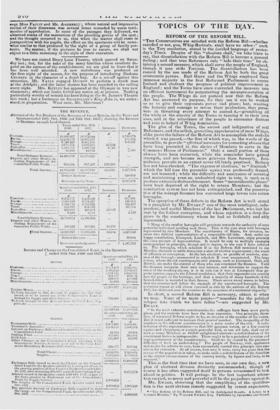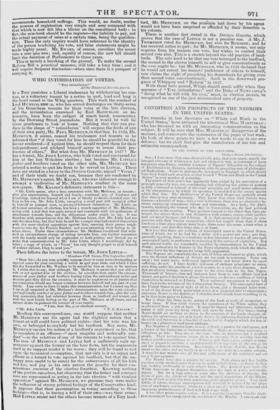TOPICS OF THE DAY.
REFORM OF THE REFORM BILL.
"THE Conservatives are satisfied with the Reform Bill-whether satisfied or not, you, Whig-Radicals, shall have no other :" such is the Tory resolution, stated in the decided language of yester- day's Times. Despite of this "absolute shall," we take leave to say, that dissatisfaction with the Reform Bill is become a general feeling ; and that true Reformers only " bide their time" for ob- taMing a second measure, which shall serve the people of England, though it may stifle Toryism. The dissatisfaction has been caused by the use made of the Reform Act by both the great aristocratic parties. Earl GREY and the Whigs employed their immense majority in the first Reformed Parliament to coerce Ireland and obstruct the progress of political improvement in England ; and the Tories have since converted the measure into an efficient instrument for perpetuating the misrepresentation of the people. The Whigs do not pretend now that the Reform Act has answered its purpose, for they see it can be worked so as to give their opponents power and place; but, wanting the honesty and courage to revise their production, they perse- vere in thwarting every attempt to amend it,-grumbling all the while at the alacrity of the Tories in turning it to their own uses, and at the reluctance of the people to encounter distress and ruin in behalf of Whig domination. The glee of the Tories, the sorrow and indignation of real Reformers, and the selfish, grovelling apprehension of mere Whigs, alike prove the failure of the Reform Act to accomplish the ends for which it was passed,-the first of which was, in the words of the preamble, to provide " effectual measures for correcting abuses that have lone prevailed in the choice of Members to serve in the Commons House of Parliament." Only a small portion of those abuses have been corrected, while the remainder have gained strength, and are become more grievous than formerly. Inti- midation prevails to an extent never till lately practised. Bribery has not been checked. "The expense of elections," to " diminish " which the bill (see the preamble auain) was professedly framed, are not lessened ; while the difficulty and annoyance of securing and maintaining even an undoubted right to vote, is such as to produce extensive disfranchisement. Some " inconsiderable places" have been deprived of the right to return Members; but the nomination s) stem has not been extinguished, and the preserva- tion of the corrupt freemen has converted large towns into rotten boroughs.
The operation of these defects in the Reform Act is well stated in a pamphlet by Mr. EWART ;* one of the most intelligent, inde- pendent, and useful Members of the last Parliament, who lost his seat by the foulest corruption, and whose rejection is a deep dis- grace to the constituency whom he had so faithfully and ably represented.
"Many of the smaller boroughs still gravitate towards the authority of some powerful individual residing near them. This is the case even with boroughs represented by two 31erobers. The constituency of Ripon, for instance, re- turns two faithful representatives of a respectable old lady. And, under our happy constitution, Liverpool, Lambeth, and Mrs. Lawrence, enjoy precisely the sante amount of representation. It would be easy to multiply examples correspondent in principle, though not in degree, to the case I have referred to. The boroughs, which schedule 13 in the Reform Bill restricted to one Member, thresten to settle down into a state of elective acquiescence ; the result of influence or corruption. At the late elections, so prolific of contests, nine- teen of the boroughs enumerated in schedule B were uncontested. The large towns, where the old constituencies still remain, such as Liverpool, Hull, and Bristol, are under the control of those who can command the freemen. Until the freemen recognize their own real interest, and determine to suppart the cause of the working cla-ses, it is in vain (as it was at Liverpool) that po- pular opinion supports the Liberal candidates, that their opponents can scarcely face the people on the hustings, and that a majority of many hundreds of the householders is recorded in their favour. There seems every reason to believe that the counties will follow the example of the unreformed boroughs. The notorious tenant.at will clause (resisted in vain by the authors of the Reform Bill) has delivered over the counties to the nominees of a territorial oligarchy."
In short, a second Reform Bill is necessary, obtain it when we may. Some of its main points-" remedies for the political relaps.e into which we have fallen "-are suggested by Mr. EWART.
" In the most extensive constituencies the suffrages have been most purely given, and the contests have been the least expensive. One principle, there- fin e, of renovated Deform ought to be, an increase of the number of the voters. But it is not sufficient to increase their general number. The inequality of the numbers in the different constituencies is a main source of the evil. A redis- tribution of the representation-so that $00 ignorant voters, or a few country squires and clergymen, or a single privet ful lord, or one old lady, shall not re- turn as many Members as 10,000 enlightened electors-a redisttibution of the constituent bodies is indispensable. There ought to be a periodical revision and repropia tionment of the constituencies. Shall we be scared by the presumed difficulty, of !quell an undertaking ? The people of Norway, with appliances and nie.ins far inferior to ours, have successfully carried this principle into exe- cution for centuries. At all events, how easy it were, every ten years that the CUSHY OC the population is taken, to make such a redistribution of the franchise as the altered circumstances of the country testify, by figures and facts, to be requ i red."
This is the first time that we have seen, in our own day, a new plan of electoral division distinctly recommended; though of
course it has often suggested itself to persons accustomed to look ahead in politics. It will perhaps be the last important altera. -
tion carried, so many and powerful will be the prejudices against it. Mr. EWART, observing that the simplifying of the qualifica- tion is the next obvious remedy suggested by recent experience,
• -TliP Reform of the Reform Bill, and its Anticipated Results. A Letter to * Cabinet Minister." By WILLIAM EWART, Lb11. lisblisliesl by SAURORRE and OTLIa. recommends household suffrage. This would, no doubt, render the process of registration very simple and easy compared with that which is now felt like a blister on the constituent body : in fact, the rate-book should be the register—the liability to pay, not the actual payment of rates at a certain time, being the qualifica- tion. Then the only inquiry would have reference to the identity of the person tendering his vote, and false statements might be made highly penal. Mr. EWART, of course, considers the secret vote a sine qua non; and, equally of course, the new bill should limit the duration of Parliaments to three years. This is merely a breaking of the ground. To make the second Reform Bill a practical measure, will take a long time ; and it will require frequent discussion—when once there is a prospect of carrying it.



























 Previous page
Previous page